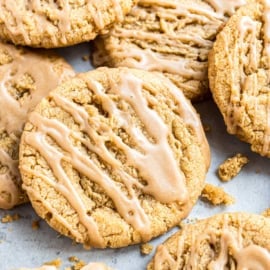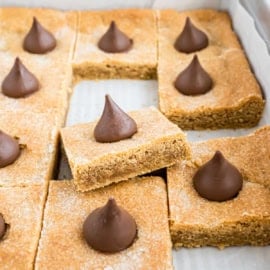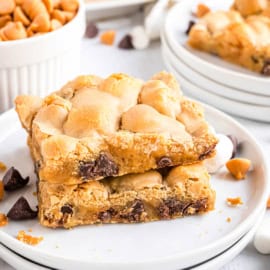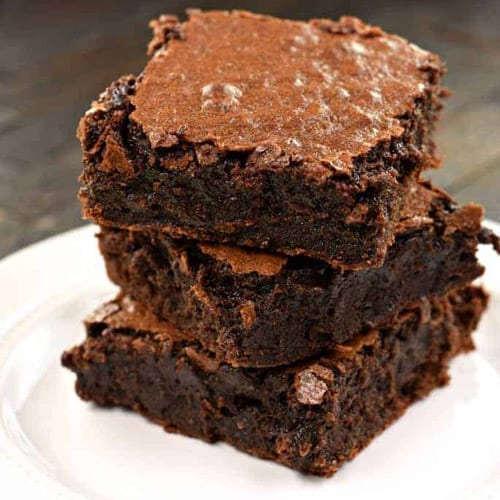Pistachio Macarons bring a little nuttiness to the dainty French cookie! Decadent meringue based cookies are held together with a pistachio buttercream frosting. Impress your family and friends with these perfect homemade macarons.

I love making perfect delicate macaron cookies in all kinds of flavors. Read my ultimate guide for How to Make Macarons for all the tips and tricks you need!
Why this Recipe Works
Let’s get one thing out of the way: macarons take a little care and attention. They’re not the most forgiving of cookies to make–which is one of the reasons they’re so impressive!
But never fear. With a good recipe you CAN make homemade macarons! And this Pistachio Macarons recipe is the BEST.
What’s life without a little challenge, right?
- The combination of almond flour, caster sugar and egg whites in the shells creates a cookie that’s everything a macaron should be. They’re sweet with a crunchy exterior that melts in your mouth as you take a bite.
- Ground pistachios blended right into the buttercream filling add an amazing nut flavor to the sweet filling. These are macarons worth swooning over!
Ingredient Notes

Almond flour. Not to be confused with coarser almond meal, this flour is an essential ingredient in any macaron. I use Besti Super Fine Almond Flour for best results.
Gel food coloring. This is optional if you’d like to add some green pistachio color to your shells.
Cream of tartar. Using cream of tartar helps create stiff peaks more quickly and consistently. If you don’t have it, go ahead and make the recipe without.
Pistachios. If you buy them in shells, remove the shells before using.
Tips and Tricks
- Use a metal bowl: Making meringue in a metal bowl results in stiffer peaks as the egg whites stabilize. More air will be incorporated too, giving the pistachio macarons the best consistency.
- Measure precisely: I recommend a kitchen scale for this recipe if possible. The more precise your measurements, the better your results.
- Check your oven temperature: Investing in an oven thermometer will help all your homemade treats turn out better! Most home ovens don’t measure temperature accurately. The proper oven temperature is essential when making macarons.
- Use two sheet pans: Bake the macaron shells on two sheet pans (one stacked on top of the other. This helps with insulation so the bottoms of the shells don’t become over heated. Good quality aluminum pans yield best results.
- Use the ‘Figure 8’ test: During the macaronage stage of the instructions, doing the ‘Figure 8 test’ after every fold helps ensure you reach the perfect lava-like macaronage consistency. Draw a figure eight with the macaron batter. If it flows smoothly off the spatula, it’s ready to pipe onto the baking sheet.
- Give our lemon macarons a try next! Filled with a homemade lemon curd frosting.

Recipe FAQs
There’s a simple test to determine soft peaks vs stiff peaks: soft peaks will lean to the side of the bowl. You’ll notice a curl at the top. Stiff peaks will stand upright and point upward.
If your almond flour seems damp when you open the package, transfer it to a baking sheet. Bake at 300 F for 8 to 10 minutes to dry it out.
If your filling breaks or crumbles when mixing, microwave 1/4 cup of the buttercream to melt it. Return the melted filling to the bowl and mix it back in with the rest.
If your filling got watery, it means the butter probably melted. Place the bowl of filling in the fridge for a few minutes to let it firm up.
No one will come arrest you if you eat these macarons right away, but trust me: waiting until the next day makes them SO much better!
Plan ahead of time to make the pistachio macarons the day before you want to serve them. You won’t regret it!

More Cookie Recipes
- Love macarons? Try these Strawberry Macarons next time!
- Melt-in-your-mouth Butter Cookies are the perfect cookie for any sweet treat time!
- Oatmeal Chocolate Chip Cookies or Oatmeal Raisin Cookies? Which do you prefer?
- These Peanut Butter Chocolate Chip Cookies are for my chocolate peanut butter lovers! Easy, simple, and creamy!
- Make these classic Snickerdoodles for your kids lunches this week! Cinnamon lovers delight!
Pin this now to find it later
Pin It
Pistachio Macarons Recipe
Ingredients
For the Shell
- 2 large egg whites
- ⅛ teaspoon cream of tartar optional, see notes
- ¼ cup granulated sugar
- 1 ¼ cups powdered sugar
- ¾ cup super fine almond flour
- Gel Food Coloring (optional, see notes)
For the Filling
- ½ cup shelled pistachios
- 2 large egg whites
- ¾ cup granulated sugar
- ½ cup butter softened to room temperature
Instructions
For the Shell
- Line two large sheet pans with parchment paper or silpat mats.
- Add the egg whites to the bowl of a stand mixer fitted with the whisk attachment. Beat the egg whites on low speed
until they become frothy. Add the cream of tartar and turn the speed to medium-high. - Add the granulated sugar slowly, making sure that it becomes fully incorporated between each addition. It should take about 2 minutes to add all of the sugar– try not to rush!
- Once all of the sugar has been added, allow the mixer to run on medium-high speed until the meringue reaches a stiff peak.
- Add the powdered sugar and almond flour to a fine mesh sieve and sift them into the egg whites. Make sure to discard any large lumps– don’t force them through the sieve.
- Using a rubber spatula, gently fold the dry ingredients into the egg whites. Try not to deflate the egg whites too much and make sure to get all the way to the bottom and scrape the sides as you fold.
- Once the dry ingredients are fully incorporated (about 1-2 minutes of folding), add gel food coloring, if using.
- Continue to fold the meringue together– you can be a bit less delicate at this point. As you fold, smush the batter against the sides of the bowl and then fold it back together. Repeat the smush-and-fold for another 30 seconds before testing to see if the meringue is at the figure 8 stage. If the meringue flows smoothly while you draw an 8, it’s ready to pipe. If the stream breaks while you draw the 8, continue the smush-and-folds a few more times before retesting.
- When the mixture flows smoothly, transfer the meringue to a piping bag fitted with a small round tip (I like a Wilton #10 or #12).
- Hold the piping bag straight up and down and pipe small (1.5”) circles about 2” apart on the parchment/silpat lined
baking sheet. - Once you’ve finished piping the tray, hold it a few inches off the counter and drop it straight down to release any air bubbles. Repeat 5-6 times or until any large air bubbles have popped.
- Set the macarons aside and allow them to rest for 30 minutes. The macarons will be ready to bake when you can touch
them gently without the meringue sticking to your finger. - While the macarons rest, preheat the oven to 325F. Bake the macarons one tray at a time for 14 minutes, turning the tray halfway through baking so they don’t get lopsided. Allow the macarons to cool fully on the tray– if you try to remove them while warm, they may stick.
Make the Filling
- Place the pistachios in a food processor and pulse on high speed until they become a fine powder– about 1 minute.
- Place a small saucepan of water over medium-high heat and place a heatproof bowl over the saucepan.
- Add the egg whites and sugar to the saucepan. Whisk continuously until the sugar has dissolved and the mixture reaches 165F with an instant read thermometer– about 4 minutes.
- Transfer the egg whites and sugar to the bowl of a stand mixer fitted with the whisk attachment.
- Turn the mixer to high speed and beat until the egg whites have formed stiff peaks and are no longer warm to the touch– about 10-12 minutes.
- Next, switch the mixer to the paddle attachment and add the butter 1 tablespoon at a time, allowing it to fully incorporate before adding another piece. It’s important that both the butter and meringue be room temperature so the mixture doesn’t crack (but if it does crack, it’s easy to fix– see notes).
- Once all of the butter has been added, add the pistachios and vanilla extract and mix on medium speed just until incorporated.
- Transfer the mixture to a piping bag and store in the fridge until ready to use.
Assemble & Age
- Place the cooled macarons in similar sized pairs. Pipe a small dollop of filling onto the center of each macaron. Press the second macaron gently on top of the filling and press them together until the filling reaches the edge. Repeat with the remaining macarons.
- Transfer the macarons to an airtight container and store them in the fridge overnight to age. Make sure to bring them to room temperature before serving.
Notes
- If your filling breaks, remove ¼ cup of the buttercream and place it in a small microwave safe bowl. Microwave it until melted and then add it back into the filling and continue to mix on high speed. If the filling becomes thin and watery, it means that your butter melted. Place it in the fridge to chill until it is no longer warm to the touch– about 15 to minutes. Then, continue mixing on high until the buttercream forms.
- For best results, use a kitchen scale to measure the macaron shell ingredients.
- Soft vs. Stiff Peaks: A soft peak leans to the side and curls at the top. A stiff peak stands straight up with the peak pointing upwards.
- If your almond flour seems wet or oily, bake it at 300F for 8-10 minutes to dry it out. You don’t want it to brown— just dry.
- I always recommend using a metal bowl when making macarons as the eggs whites can attach to metal easier than they can to glass. This allows the meringue to stabilize more while also incorporating more air.
- Proper Folding Technique: Move the spatula in a “j” shape by cutting the middle of the meringue and then sweeping the spatula along the bottom of the bowl to one side and then back over the top. Turn the bowl 90 degrees and repeat.
- Proper Oven Temperature: Most home ovens do not have accurate temperature gauges— therefore it’s important to have an oven thermometer so you truly know what temperature your oven is. You want the temperature in your oven to be as close to 315 degrees F as possible.
- Sheet Pans. My number one trick for perfect macarons is to double up your sheet pans! I use USA Pans— good quality aluminum pans— and I double them to insulate the macarons and prevent the bottoms from becoming overheated (which could lead to browning and/or spreading).
- Figure 8. My second trick for perfect macarons is to test the meringue often during the macaronage stage (see step by step instructions). Macaronage is by far one of the most common problems encountered when making macarons because it has to be done perfectly! Doing the figure 8 test often (after every fold) will ensure that you achieve the perfect consistency every time!
Nutrition
More Cookie Recipes
See all Cookies recipesOnce you try this delicious Pistacho Macaron recipe you’ll be convinced: pistachios and macarons were made for each other! Follow my instructions for deliciously perfect meringue cookies every time.






I actually made my own pistachio flour by finely grinding them in my coffee bean electric grinder. It worked great. Then to dry it out abit I baked the pistachio flour just enough to dry it out not to brown it. And added half almond flour and half the pistachio flour and they turned out great! Good luck
I’ve made these twice this week now! Lol. They are so easy and super yummy. The whole family couldn’t get enough. They are a great treat with a cup of coffee anytime of the day!
Can I use a sugar free sweetener when making these? Also, I noticed in another recipe, they made their macarons with Pistachio flour.. ??
From your tips and tricks: Use a metal bowl: Making meringue in a glass bowl results in stiffer peaks as the egg whites stabilize. More air will be incorporated too, giving the pistachio macarons the best consistency. Your images show a metal bowl so I am guessing that is preferred over the glass bowl and maybe this is just a typo?
Is there a way to get pistachios in the cookie/merignue part as well as the filling?
You can use pistachio extract and sprinkle some chopped pistachios on the top before baking.
I feel like a real baker now. The pistachio filling was so unique and the sweet flavor was perfect.
Macarons are our favorite but it is expensive store-bought so I’m really glad that I found this recipe. I tried it and followed everything as instructed and it came out so good and yummy! Thank you for this precious recipe.
Looks so good! Can’t wait to try this one.